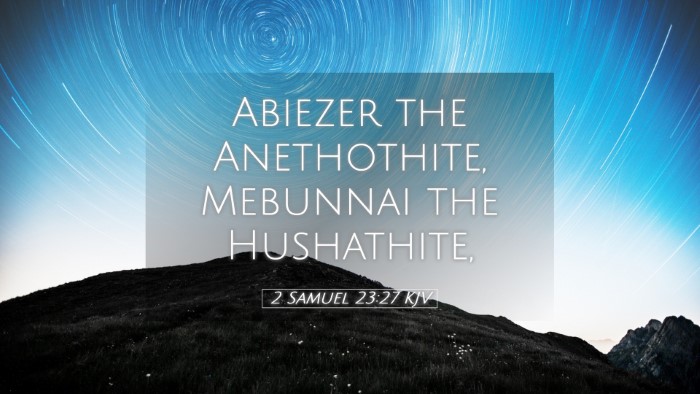Commentary on 2 Samuel 23:27
Bible Verse: "Abialbon the Arbathite, Mehtaï the Netophathite," (2 Samuel 23:27)
Introduction
This verse is part of a larger passage detailing David's mighty men. The inclusion of Abialbon and Mehtaï in this account isn't mere historical record; it provides a deeper insight into their roles, implications, and the theological significance behind each name mentioned.
Contextual Overview
David’s mighty men, documented in 2 Samuel 23, were known for their valor and loyalty during David’s reign. This chapter serves not only as historical documentation but also illustrates the divine providence and leadership qualities of David as a king, as well as the character traits esteemed in God's service.
Exegesis of Key Names
-
Abialbon the Arbathite
The Arbathites were likely from the region of Arbah, indicating Abialbon's identity as a warrior from a specific locality. Commentators like Matthew Henry note that the specificity of location highlights the diversity within David’s ranks, showing God’s provision through various tribes and backgrounds unified in their loyalty to David.
-
Mehtaï the Netophathite
The Netophathites, additionally derived from the village of Netopha, represent another geographical detail. Albert Barnes emphasizes that having men from different places not only reflects David’s inclusive leadership style but also symbolizes the unification of different tribes under one God.
Theological Implications
Both characters reflect the notion of service in the kingdom of God. As Adam Clarke suggests, their inclusion in David's list symbolizes God’s choice of individuals for service regardless of their backgrounds, thus delivering a clear message of providential selection and the empowerment of the lowly to participate in significant tasks.
Applications for Leadership
The relationships seen in David’s mighty men provide vital lessons for modern-day leaders:
- Inclusivity: Just as David included men from varied backgrounds, leaders should embrace diversity, valuing contributions from every individual.
- Valor in Teamwork: The noble acts of these men signify strength in unity and teamwork, a crucial element for any successful leadership.
- Recognition of Contributions: The attention given to each mighty man illustrates the importance of acknowledging each member's contributions in any collective endeavor.
Historical Context and Cultural Significance
Understanding the culture of ancient Israel sheds light on the significance of these individuals. Military valor was greatly esteemed; thus, their names carry weight, much like modern honors or commendations. Their mention signifies not just loyalty but a testimony of God’s faithfulness, allowing these men to achieve greatness through His strength.
Conclusion
In sum, 2 Samuel 23:27 serves as a reminder of the faithful service that builds foundations for God's kingdom. The characters of Abialbon and Mehtaï, while perhaps lesser-known, offer profound insights into loyalty, diversity, and God's sovereign appointment. For pastors, students, theologians, and scholars, their reflection prompts a deeper understanding of how God works through ordinary men to achieve extraordinary results.


